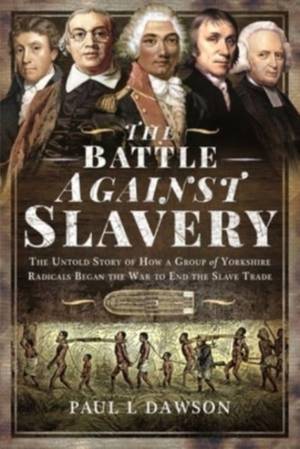
- Afhalen na 1 uur in een winkel met voorraad
- Gratis thuislevering in België vanaf € 30
- Ruim aanbod met 7 miljoen producten
- Afhalen na 1 uur in een winkel met voorraad
- Gratis thuislevering in België vanaf € 30
- Ruim aanbod met 7 miljoen producten
Zoeken
The Battle Against Slavery
The Untold Story of How a Group of Yorkshire Radicals Began the War to End the Slave Trade
Paul L Dawson
Hardcover | Engels
€ 34,95
+ 69 punten
Omschrijving
On 13 December 1776, the Rev. William Turner preached the first avowedly anti-slavery sermon in the North of England. Copies of his sermon were distributed far and wide - in so doing, he had fired the first shot in the battle to end slavery had begun.
Four years later, Rev. Turner, members of his congregation and the Rev. Christopher Wyvill founded 'The Yorkshire Association' to agitate for political and social reform. The Association sought universal suffrage, annual parliaments and the abolition of slavery. In the West Riding, despite furious opposition, by 1783 nearly 10,000 signatures were collected in support of the aims of the Association. Slavery, or rather its abolition, was now on the political agenda.
The Battle Against Slavery charts the story of a group of West Riding radicals in their bid to abolish slavery both in the United Kingdom and abroad. Such became the influence of this group, whose Unitarian beliefs were illegal in Britain, that the general election of 1806 in Yorkshire was fought on an abolitionist platform. At a time when the rest of the world engaged in slavery, this small body was fighting almost single-handedly to end such practices. Gradually, their beliefs began to spread across the country and across the Channel to France, the principles of which found resonance during the French Revolution and even across the Atlantic to America.
At a time, today, when the history of slavery is the subject of considerable debate worldwide, this revealing insight into the abolitionist movement, which demonstrates how ordinary men and women battled against governments and the establishment, needs to be told. The Battle Against Slavery adds an important dimension to the continuing debate over Britain's, and other nations', involvement in the slave trade and demonstrates how the determination of just a few right-minded people can change world opinion forever.
Four years later, Rev. Turner, members of his congregation and the Rev. Christopher Wyvill founded 'The Yorkshire Association' to agitate for political and social reform. The Association sought universal suffrage, annual parliaments and the abolition of slavery. In the West Riding, despite furious opposition, by 1783 nearly 10,000 signatures were collected in support of the aims of the Association. Slavery, or rather its abolition, was now on the political agenda.
The Battle Against Slavery charts the story of a group of West Riding radicals in their bid to abolish slavery both in the United Kingdom and abroad. Such became the influence of this group, whose Unitarian beliefs were illegal in Britain, that the general election of 1806 in Yorkshire was fought on an abolitionist platform. At a time when the rest of the world engaged in slavery, this small body was fighting almost single-handedly to end such practices. Gradually, their beliefs began to spread across the country and across the Channel to France, the principles of which found resonance during the French Revolution and even across the Atlantic to America.
At a time, today, when the history of slavery is the subject of considerable debate worldwide, this revealing insight into the abolitionist movement, which demonstrates how ordinary men and women battled against governments and the establishment, needs to be told. The Battle Against Slavery adds an important dimension to the continuing debate over Britain's, and other nations', involvement in the slave trade and demonstrates how the determination of just a few right-minded people can change world opinion forever.
Specificaties
Betrokkenen
- Auteur(s):
- Uitgeverij:
Inhoud
- Aantal bladzijden:
- 280
- Taal:
- Engels
Eigenschappen
- Productcode (EAN):
- 9781399018487
- Verschijningsdatum:
- 22/03/2022
- Uitvoering:
- Hardcover
- Formaat:
- Genaaid
- Afmetingen:
- 155 mm x 236 mm
- Gewicht:
- 589 g

Alleen bij Standaard Boekhandel
+ 69 punten op je klantenkaart van Standaard Boekhandel
Beoordelingen
We publiceren alleen reviews die voldoen aan de voorwaarden voor reviews. Bekijk onze voorwaarden voor reviews.







